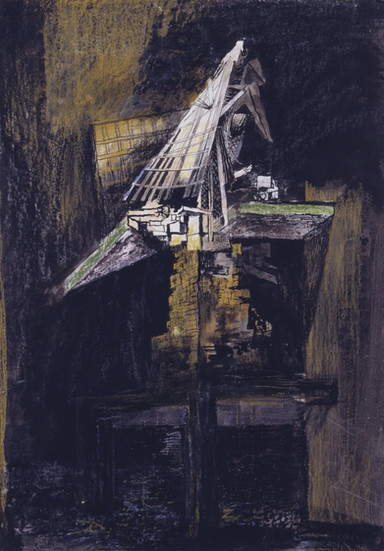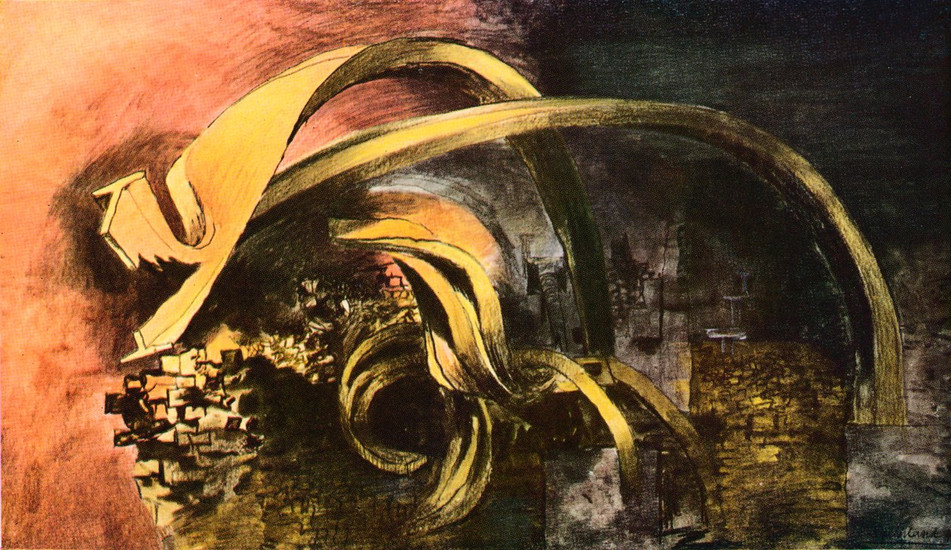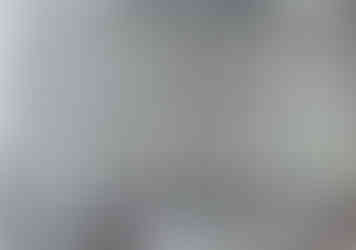Little Prayers - Nov 15, 2025
- The Big Ship

- Nov 14, 2025
- 7 min read
What is Little Prayers?
Little Prayers is a self-destructing art writing column. With each instalment, the previous one deletes forever. The vital alchemy of a Little Prayer - short in length and lifespan - permits writing at its most personal and experimental. Feature your Little Prayers by responding to these prompts.
This week, we trace the outline of our denials and find there the shape of what we love.
Graham Sutherland - Is That a City
"I can connect nothing with nothing."
Imperceptible autumn. The earth floor flipped as it dreamt of falling into winter, and on waking I found that it had. In the blue through the thinned veil I saw I had been in deferral too long, and I knew then that I could no longer be alone.
When you ask something of a city you drop a stone into its well and await a response. It doesn't have to be a stone. It can be a golden locket, a handful of coins, a felt rabbit, an umbilical chord. But echo has no gestalt. That is to say, the city is not a 1:1 configuration of its interred heads. Most often the noise it returns is garbled, brown, like the tangled net of shower song. I had moved to the city asking for friends and opportunity. Into the well I threw an acorn and my last clean lung. But in the folds of my heart I knew my phrasing was uncertain, and it has proffered uncertain returns. Sprained labyrinths, centuries of roundabouts, a hippie lost in the twenty-first, Fidelio, pinched noses in the diamond district, The Purple Witch...
"My magic system", The Purple Witch assured me, "is quite simple really. I'm just a dowser for the water-mill." She pushed her palms up, out, around, and closed. One finger, "knowledge", on the second, "gifts."
"I exchange gifts for knowledge from strangers then offer it back to the universe, This is done in various ways, but one is to find a statue of an important figure - Richard Cobden, Amy Winehouse - and shout to them all the knowledge I've gathered. They are conduits back to the mill."
I told her some wisdom from a friend and she gifted me a tarot card, the Ten of Cups. Abundance, overflow.
"When the doctors told me I was bipolar I was sad for a very long time, but I had my spiritual awakening at age 46. Now, I know where to put the surcharge. I lead a very full and happy life tying up loose ends, tidying up the overspill."
My God, I thought, is there nowhere in the city to go mad in peace? Who is in charge of this hermitage? Tell them there's no more room at the inn.
- Written by Caleb Carter
Andrea Galassi - Gran Madre di Dio
The Cheek
Mother Mary, pull me flush against the blush of your living cheek; let the little chapel of your stubborn heart drum my blood out through every estuary and haul it home again; tide obedient to moon. Stitch me into the blue hem of your mantle; make a harbour of your shoulder; quiet the storm with your soft breath.
I was taught The Father was all sky and fire: white-hot, out-of-reach, all-knowing. Useful in the abstract. But once we hit Earth, we don't reach for constellations. We bury deeper into soil. Besides, you carried more than he did. Your son's cross was yours too. You did the private weight: the watching, the lift before and after. No crowd for that, no miracle or lights.
Teach me to stay. I want work that can hold a person. A life that can hold a person. If all I can do is keep a head from falling, that's enough.
- Written by Bryson Edward Howe
Jean Cocteau - La Belle et La Bête

"He felt no fear although he knew by the pervasive atmosphere of a suspension of reality that he had entered a place of privilege where all the laws of the world he knew need not necessarily apply, for the very rich are often very eccentric and the house was plainly that of an exceedingly wealthy man."
- Angela Carter, 'The Courtship of Mr. Lyon', The Bloody Chamber
There's plenty to be said for the ravaging potential of the beast, whose sadism is both a shadow of Belle's suppression and an oppression that must be withstood, then tamed ("Mr Grey will see you now") and the secret disappointment in its ultimate bathos: aw, but he was so much sexier as a lion. I'm intrigued by the sensuality of Cocteau's film - of the sensuality implicit in fairy-tales, whose shape is the conical lure, of cricket eyes through blackthorn, of isabiri swung low over the squall. But I'm even more intrigued by the material that darns them in like a red runner through the castle's smoked gilt. Not haunted; enchanting. Rose. Oud. Lavender. Colloidal water giving way to milk-teeth dreams. Handsy candelabras like heliotropes to grace, the weight of mink furs on skin, all their imaginary grunting, the heft of a lion's head, his blood sticky-sweet, menstruatl blood the bear-skin bed-dress, pulled in slow tides over silk sheets, his lace ruff like a queen's, otherwise a scarab brooch at the nape, or a choker of pearls. Something heavy, someone adorned. Luxuries, value and the elect that are bestowed. The feeling of thread by the fire after being freshly bathed.
- Written by Caleb Carter
David Hepher - Arrangements
Walking down Effra Road I see it: one purple firework blooming from the roofline of the estate, a solitary throat of colour against the dark. Purple cracks the air's crooked spine, a hot bloom unmoored in swimming blackness without hook or chorus, just one ⋆✴︎°。⋆ shot into brick-mouth night, an oblation to what?
Who would waste a sky on only one?
Who believes in enough to do without witness?
(not me)
Violetta shardling, shuck open the night with wet smoke-cough; an act both so private and so excessive, sent upward, burnt the air for half a heartbeat *ੈ✴︎⋆ then collapsed to huskk, collapsed to hush, collapsed collapsed and then its sudden absence, nothing left but night's grey yawn and purple still bleeding on the back of my eye. I used to think my walks had narrative: I left the house, I saw something, I came home. A cluster of teenagers cuffing each other with mock violence, laughing, talced in late-spring sunlight. A cute dog tied to a railing. The smell of burnt pine and bay. But what I actually saw was this: someone climbed to the roof, thumbed the fuse, and said fuck it, or bless it, and it's beautiful that someone, somewhere, still insists on rupturing silence with light, even without the comfort of narrative or witness or eternity.
- Written by Bryson Edward Howe
Giorgio Morandi - Still Life

The tenth chime was to signal the convergence of segment l and segment m, the completion of the pentacle, and the adjournment of tea. This was thirteen years after my grandmother’s death (on my mother’s side), two years before my father’s, thirteen before my mother’s, ten before my own, and fifty before my younger brother’s; all present and accounted for. The ninth chime had come – as advised: only when moved by some “voice” or other preternatural supposition; an impulse – between my grandmother and my younger brother. My brother, who had not yet chimed, and worked for a real-time node-based digital programming company tracking bacterial decay on Mesolithic culinary tools, and which had been explained to my grandmother, who had worked as a secretary in the daytime and a hotel waitress at night, in great detail, and had been explained in vain, had hovered his hand over a row of utensils laid out on the lower right quadrant (fire axis) of the kitchen table for most of tea. This quadrant included silverware, icing spatulas, and old boning knives. Without noticing, he had picked in his right hand a browning tea strainer, the same that we had once, as boys, held as we ran through the estate pretending to open parallel dimensions via the activation of its hinged jaws, and it was only when my grandmother surreptitiously swiped with her right hand the ring dish made of real jade that her own son (and my mother’s brother) had brought back from his trip to China did my brother move the tea strainer from his right hand into his left hand and bring it across to chime with the jade dish, as if in riposte. The chime was a light, glassy tinkle, on account of the real jade being struck with an aged, sieve-like medium. The conversation, which had strayed from archaeological cybernetics to the milk-of-lavender algae that glows upon the surface of oceans in the afterlife, died, and my brother and grandmother respectively placed the tea strainer and the jade dish on the small, round, French lace place-mat alongside the previous 16 items. We were not to know their wider meaning, though we could guess: something to do with China, byway of both my uncle’s travels and the symbol of tea, or perhaps travel more broadly, or a fraternal strand as both items were significant to my mother’s brother who was not present and between my brother and I who were. Amongst these and stolen Hard Rock Cafe glasses, earthenware salad dishes and forks, were a novelty lemon egg-timer & a 1/64 tsp. stainless steel measuring spoon, as well as a ramen bachi &, coincidentally, the accompanying chopsticks it was originally purchased with. The tenth and final chime came as a surprise to us all, when a fly collided with my father’s favourite coffee mug sporting a faded Winnie-the-Pooh design, and promptly knocked itself dead. The chime was short, low and flat. The conversation died, and my father placed both the mug and the corpse of the fly onto the place-mat. At this, the restoration of the apotropaic, the door was sealed, and we must not speak another word, so we smiled our farewells. My grandmother silently folded the corners of the place-mat over the items, tied them into a small knot and, after a nod, picked up the bindle so that every item, toppled in cloth, chimed at once, and then we were no longer in the room. All of our unselected items remained, played upon by the radial light of days and humming, if for no one to hear, then across its porcelain lattice the melting song of our fingerprints.
- Written by Caleb Carter
Credits:
Caleb Carter is a co-founder/editor of The Big Ship
Bryson Edward Howe is a co-founder/editor of The Big Ship




















Comments